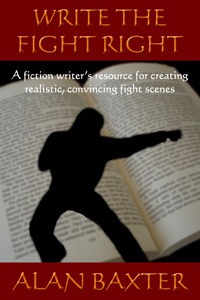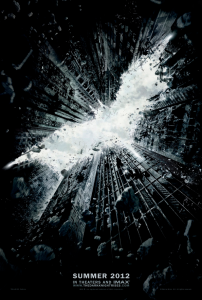Alan Baxter's Blog, page 80
August 3, 2011
Book in the post and publishers doing it right
I posted yesterday about royalty-only anthologies and the issues I have with them. Interestingly, today I checked my P O Box and had a parcel. Inside were two books.
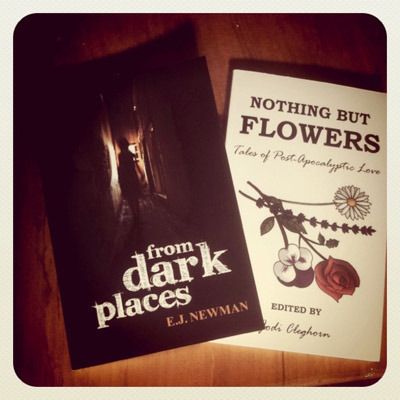
These are copies of two of the books from emerging publishing powerhouse Jodi Cleghorn. One is the charity anthology Nothing But Flowers, which is a speculative fiction anthology raising funds for the Grantham Flood Support Fund. The other is the debut collection from new voice in dark fiction, Emma Newman, called From Dark Places. Jodi asked me to read and blurb this collection, which I was more than happy to do. Newman writes excellent short fiction and I'm pleased to have my endorsement on the back cover.
After my ranting yesterday about publishers doing it wrong, Jodi is an example of someone doing it right. She asked me to help with the book, I was happy to do so and she sent me a copy for my trouble. That's looking after people and creating an environment where creatives will be quite prepared to help out again and promote the good stuff. Which is exactly what I'm doing here. Jodi's also a writer, so she gets it. The work she publishes is well worth your time and money.
You can get your own ebook or print copy of Nothing But Flowers here.
Get your ebook or print copy of From Dark Places here. This really is a quality collection of dark short stories. I reviewed it here on its initial release, if you're interested to learn more.
Way to go, Jodi. Keep up the good work.
.
August 2, 2011
Royalty-only anthologies and writer exploitation
I made a comment on Twitter that caused a flurry of reaction. I won't call it a storm, I'm not Stephen Fry or Neil Gaiman, who can break a website with a single tweet, but the response to my comment was interesting nonetheless. I was basically lamenting the continued rise of anthology submission calls that are "paying" writers with royalties only. I have a problem with this, and I'll explain why.
It's well known that most of us don't get paid anything like what we're really worth as writers. Yet those of us who persevere should see a slow increase in how much we can make for our writing, as our skills improve and our reputation becomes estbalished. A lot of writers get their first publication credits in FTL publications. (That's For The Love, not Faster Than Light. Althought Faster Than Light Publications is not bad name for an SF press, but I digress.) I got my own early publications in places that paid nothing but exposure. There's nothing wrong with that at all. Most of those places will say something like, "We'd love to pay our authors but we can't afford to offer anything but exposure at this stage." They're honest and there is a place for that, especially with online zines. And authors know exactly what they're getting.
Some writers are happy to put stuff out through those venues indefinitely, but the majority of people will slowly graduate to better, paid gigs. For this reason, those FTL markets almost always comprise up and coming writers and no recognised names, but that's kinda their purpose.
The next level up from writing for nothing but "exposure" (and I use quotes, because, let's be honest, not many people read those places) is getting paid a flat rate and/or contributor copies. Often a market, expecially online fiction markets, will pay a token rate. Even $3 or something like that through PayPal. It's next to nothing, but it's something and it's honest. The author knows what they're getting.
Along with, or instead of, a token amount is a contributor copy payment. Let's assume the market is paying nothing but contrib copies. That's fair enough if they're clear about that. Something like, "We can't afford to pay writers for their stories, but each contributor will receive a copy of the issue(or book) their story appears in." The reason this is important, and it really is important, is because they know authors want copies of anything their work appears in. It's understandable – when a writer gets published, they want to show off their success. They want hard evidence of their hard work.
Personally, I think all print markets should, at the very least, send a contributor copy to all the authors, even if they don't pay anything. Far better than paying a token amount and not sending copies, as the author will probably end up down on the deal as they buy their own copy of the book or magazine, which likely costs more than any token payment.
Now the ideal situation is to be paid and get a contributor's copy. Even if the payment is as low as just a few dollars, plus a contrib copy, the author is getting something for their hard work. Well below anything like a viable wage, but something. The best of all worlds is to be paid well and get at least one contributor copy.
Paid well means by the word. Even 1 cent/word is usually better than a flat rate and once you hit the heady heights [/sarcasm] of 5 cents/word and above, you're doing damn well by today's fiction standards (oh, how I dream of 5c/word!) I have a personal policy that my work is worth a certain amount. I won't submit anywhere that doesn't pay my base requirement. Of course, that's my decision based on my experience, my previous publication history and what I think my work is worth. I expect to regularly revise that policy and I hope to always revise it upwards! But, as I said, I got my start in FTL markets like so many others and that's good. And I'll still contribute to lower paid markets if I like the concept, respect the publisher, get invited, and so on. No rules are hard and fast. But I always know what I'm getting.
So why are royalty-only markets exploiting writers? Because they promise something, but will almost certainly pay nothing. It's all about respect for a writer. The primary reason for publishers paying royalties only is because it removes the outlay of buying stories up front, yet still reserves the hope of paying the contributors. That's fundamentally a good idea, but it's usually a problem – if that publisher has faith in their ability to edit together a good book and sell it, they should be prepared to pay for the work they include. If they can't afford an outlay and want to pay by royalty, they should at least send out contributor copies. If the book is not very successful and doesn't sell, at least the writers got a book out of it. But there's a reason they don't.
The exploitation of royalty-only is in publishers knowing that writers will want a copy of the book their story appears in. So will their family and friends, probably. So the publisher promises royalties, knowing the authors may never make a cent, but they, the pubisher, will at least make their money back because all the contributors will buy copies for themselves. Let's look at the numbers.
"Payment" of royalty-only is usually something like 60% for ebook and 20% for print (if I'm generous), shared among contributors. The rest is kept by the publisher. To keep it simple, let's look at the ebook and say it retails for $5.
For every ebook sold, the publisher gets $2 and the contributors get $3, shared among them.
Let's say there are twenty stories in the book. That's $3 shared among 20 people, or 15 cents for each author for each book sold. That's a best case example, by the way!
If the book sells 100 copies, that's still a poor payment for a story. If it sells 1,000 copies, it's starting to get pretty good. But it won't sell 1,000. No way. If the publisher could sell 1,000 copies of a book, they'd be paying for quality stories, because that's how you sell a lot of books. See the issue?
It's the sad truth that the majority of these anthologies – and there are thousands of them – don't sell at all. After all, there are thousands of them. Not one book beyond the contributors buying their own copies. So the contribs might make enough at 15c a time to cover their outlay for a copy of the print edition, though probably not. Meanwhile, the publisher makes $2 for every book sold. The net result is effectively the writers paying the publisher to have copies of a book featuring their work, that no one else will ever buy or read. Harsh? Maybe, but it's true.
It's exploitation because writers are misled into thinking they might score some income. After all, if the book only sells a couple of hundred copies, they'll at least make something right? Wrong. For one, it almost certainly won't sell more than a couple of dozen copies and there's one more part to consider. A lot of these publishers stipulate in the contract that royalties are paid after expenses are recouped. Let's say they put a production cost as low as $100 on getting the book out there. The chances of making back that $100 are pretty slim. Those publishers will probably pay more like $50 to get the book out there, rack up their $2 every time a contributor buys a copy, and sit back with a small profit of somewhere between nothing and $50.
Why do they do it? Well, I'm sure they're hoping to land a success and start shifting lots of books. They'll make a heap of cash and they can pay their authors well-deserved royalties. It's all very noble. But it's not going to happen. Still, at least the publisher should break even, right? Or possibly make a few quid without ever having to pay the authors a cent.
Now, a good publisher, who actively promotes their work and pushes their catalogue and sells books and has every intention of making themselves and their authors money might have more success and shift a lot more books. But by a lot we're talking a couple of hundred. Maybe. The money coming back to the authors is still pocket change. At least if the publisher sent out contributor copies, the authors would have pocket change and a book, but that would be too much expense for the publisher, and destroy their own primary income stream. These are publishers who refuse to carry any risk.
I've sold stories where there's a basic payment of X cents a word, plus a contributor copy, plus royalties after X costs recovered. That means I got paid for my work, I got a book and, if the book is really successful, I make even more. After all, my work is, presumably, one of the reasons it's doing so well. That's how a royalty system should work.
I'm sure a lot of these folks using the royalty-only system are full of good intentions. They really want to sell books and pay authors, but they're not going to take any risk in doing so. It's almost certainly not going to work and they're giving new writers a false sense of hope. These publishers should at least have the faith in their own work to pay by contributor copy and royalty, thereby removing the perception that they're out to make money from the authors they're publishing. Those same writers could send their work to online FTL markets, after all, where they'll still get nothing, but might at least get read by someone.
For The Love markets are one thing. Token payment markets are fair enough. Exposure only plus a contributor copy is fair enough. All these things are clear in what they're offering and the author knows what they're getting and how they may end up out of pocket if they buy a copy of the book. A lot of these places will offer authors copies of the book at a 40% discount, which is wholesale rather than retail. You'll find a lot of these royalty-only markets don't even offer that. Because they want authors to buy copies of the book they made, at full retail, as that's how the publisher plans to recoup their costs and maybe make some money for themselves. If they can break even from contributors, there's no incentive to promote the book to recover their costs. They just move on to the next one and the next one, racking up a catalogue of books no one will ever buy except the people who wrote them.
It's easy to be a publisher these days. It's great that there are so many small presses cropping up doing all kinds of interesting stuff. It's trememdous that there are so many opportunites now for writers to get their work out there. But publishers should at the very least be honest about what writers can expect, even if that's nothing, and not make back their costs back from the writers sweating blood for them.
I know this is a personal bugbear of mine and plenty of writers are happy to give royalty-only markets a stab. I know a lot of publishers genuinely want to succeed. But I think a contributor copy should be the bare minimum of payment for a print market. What about you? I'd love to hear your thoughts.
.
August 1, 2011
Winds Of Change and The Game
Here's some good news on the publishing front. Well, good news for me and hopefully for you too, if you enjoy reading my stuff. Firstly, my short story, Dream Shadow, has been accepted for publication in the next CSFG Publishing anthology, Winds Of Change, edited by Elizabeth Fitzgerald. The book will be launched at Conflux on Friday, 30 September 2011 in Canberra. I'll be there, as will a number of the contributing authors, so another good readon to get to that Con if you can.
Here's the book's blurb, from the press release:
From the first roiling dust clouds, Winds of Change draws the reader in with tales of darkness and horror, of wonder and hope. Twenty four authors demonstrate the vitality and diversity of the current Australian speculative fiction scene. Editor Elizabeth Fitzgerald has put together a thought-provoking anthology that you'll want to read in a single sitting, but which will also reward a second, more leisurely visit.
Here's the full Table of Contents:
Wraiths Jason Nahrung
Gravity Express Naomi Mondello
Time Capsule Tsana Dolichva
The Tether of Time Leife Shallcross
Trigger Zena Shapter
Babel Robin Shortt
Saint Olivia's Light Carol Ryles
In Need of Assistance Chris Andrews
After the Bombs Adam Tucker
The Horns of Elfland Crisetta MacLeod
Time Spent David Coleman
Soul of the Machine Maxine McArthur
Dream Shadow Alan Baxter
Giant Annelise Roberts
Evolution Baby Lesley Boland
The Princess Valerie Y.L. Toh
Children of the Ashes Greg Mellor
By Watcher's Pool James Goodrum
Turning the Blood Donna Maree Hanson
Watching Nicole R Murphy
The Stormchilds Helen Stubbs
The Fool Jane Virgo
Dragonfly Cat Sheely
Stone-singer Joanna Fay
Looks like it's shaping up to be a great book, so keep an eye out for that one. I'll drop another reminder here when it's available for people unable to get to the launch.
And in other short fiction news, The Game anthology, from Seven Realms Publishing, is available now in a variety of formats. You can find the Kindle version at Amazon, print and Nook at B&N and all the other good stuff to come.
I've mentioned this anthology before here, and you'll find my short story, Running Wild From The Hunt, in there. This one is a great concept antho, so I'm looking forward to reading the other contributions. It's got a stellar selection of authors on board, so have a search for that one.
.
July 26, 2011
Bulwer-Lytton Fiction Contest 2011 Results
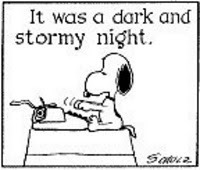 The Bulwer-Lytton Fiction Contest is one of my favourite literary events. It's a brilliant idea. It stems from the awful writing of Edward George Bulwer-Lytton. You probably think you've never heard of him. But I can almost guarantee you have. Here, see if this is familiar:
The Bulwer-Lytton Fiction Contest is one of my favourite literary events. It's a brilliant idea. It stems from the awful writing of Edward George Bulwer-Lytton. You probably think you've never heard of him. But I can almost guarantee you have. Here, see if this is familiar:
"It was a dark and stormy night;"
Yep. You know him. But did you know just how bad he was? Here's the rest of that line, from Paul Clifford (1830):
"It was a dark and stormy night; the rain fell in torrents–except at occasional intervals, when it was checked by a violent gust of wind which swept up the streets (for it is in London that our scene lies), rattling along the housetops, and fiercely agitating the scanty flame of the lamps that struggled against the darkness."
Holy crap.
It's writing like that which gave rise to the contest. During his studies Professor Scott Rice of the English Department at San Jose State University unearthed the source of that famous line, "It was a dark and stormy night", as being the opening of the Edward George Bulwer-Lytton novel, Paul Clifford. And it is a very famous line. After all, Snoopy uses it all the time and that Beagle knows his shit.
For all his hideous writing skills, Lytton coined some phrases we all know well. Among them "the pen is mightier than the sword", "the great unwashed", and "the almighty dollar". He's had an impact, has Bulwer-Lytton.
So Professor Rice, with the help of San Jose State University, has, since 1982, put together the contest which seeks the worst opening lines to the worst of all novels. You can learn all about the contest here: http://www.bulwer-lytton.com/
Meanwhile, the 2011 results are in. The winner this year is the shortest entry to ever win the contest. It comes from Sue Fondrie of Oshkosh, WI. (Yeah, I thought that was a children's clothing line for people with more money than sense, but apparently it's a place too.) Here's the winning line:
Cheryl's mind turned like the vanes of a wind-powered turbine, chopping her sparrow-like thoughts into bloody pieces that fell onto a growing pile of forgotten memories.
Top work, Sue. Congratulations.
Rodney Reed of Ooltewah, TN takes out the runner-up prize with this one:
As I stood among the ransacked ruin that had been my home, surveying the aftermath of the senseless horrors and atrocities that had been perpetrated on my family and everything I hold dear, I swore to myself that no matter where I had to go, no matter what I had to do or endure, I would find the man who did this . . . and when I did, when I did, oh, there would be words.
There are other winners in several categories (Adventure, Crime, Sci-Fi, Vile Puns, etc.) and they're all listed on the contest site here. Go and have a read. They're hilarious.
.
Alan Moore interview at The Guardian
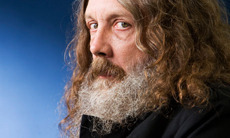 Alan Moore is one of my favourite authors of all time. He wrote the seminal graphic novels of the 80s that totally reinvented graphic storytelling – Batman: The Killing Joke, Watchmen, V For Vendetta, From Hell, League Of Extraordinary Gentlemen and so many more. He truly is a master storyteller and he's always a very contentious fellow. He has strong opinions about many things, not least of which the industry of which he's an intrinsic part. There's an interesting interview with him here at The Guardian, where he talks about his latest League project and also touches on other stuff, like how tablet technology might change comics and the value of libraries.
Alan Moore is one of my favourite authors of all time. He wrote the seminal graphic novels of the 80s that totally reinvented graphic storytelling – Batman: The Killing Joke, Watchmen, V For Vendetta, From Hell, League Of Extraordinary Gentlemen and so many more. He truly is a master storyteller and he's always a very contentious fellow. He has strong opinions about many things, not least of which the industry of which he's an intrinsic part. There's an interesting interview with him here at The Guardian, where he talks about his latest League project and also touches on other stuff, like how tablet technology might change comics and the value of libraries.
(Photograph: Murdo Macleod)
.
July 21, 2011
It might be fiction, but it has to be right
Things I've reserched today:
Ullapool to Stornaway ferry times.
Daylight hours in northern Scotland during winter.
Topographical features of the Isle of Lewis.
The Callanish standing stones.
Any guesses on where my characters might be headed right about now?
I really enjoy research. It's like travelling without moving, only less Dune-like. I love to set my stories in interesting places and put my characters into testing conditions. In this case, far north eastern Scotland in winter. But it has to be right. I can't just guess this stuff, even though I know most of the details above to some degree. If the story is going to seem real and convincing, the little details need to be right. Not about right, but exactly right.
What times does the ferry to Stornaway run during winter? Can I match that to the storyline? What time will it get dark during that part of the story?
These things are important. The best bit is that all those things are easily found. The website www.timeanddate.com gives me sunrise and sunset times anywhere I need them. The Calmac ferries website has a downloadable PDF of their summer and winter timetables. The Internet is just about the best thing to happen to research ever. I still use books. You know, the old-fashioned method. But I love being able to look facts up as and when I need them.
It's fun to be a fiction writer.
.
July 20, 2011
Harry Potter 7.2 – the end of an era
We went to see the latest and last film installment in the Harry Potter series yesterday, Harry Potter and the Deathly Hallows, Part 2. The film is pretty good, even if it is pretty much one long action scene. With a story there are normally three acts. There's a setup, with questions asked and situations created, then there's some kind of action and usually some extra problems thrown in, and finally there's resolution. I recently saw something that sums this up beautifully:
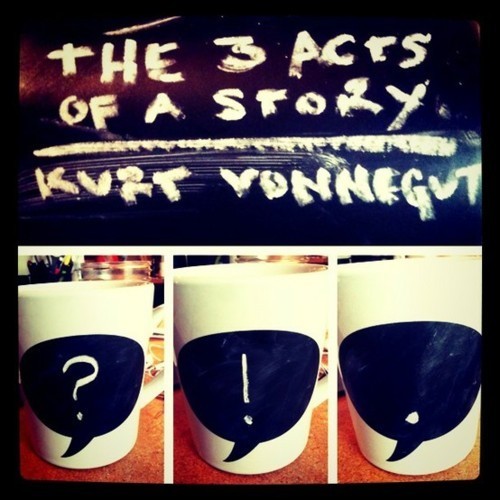
I found this via Chuck Wendig's Tumblr, and I love it so much I want to punch it in the face.
So, the problem, if you can call it that, with the last Harry Potter film is that it's all the last cup. It's all resolution, action-packed climax. But that's okay. Because seven previous films have done all the work of the first two acts.
Say what you will about J K Rowling and the Harry Potter stories, there's something truly amazing about the achievement. Sure, the stories may be derivative, distillations of so much fantasy that's gone before. But everything is informed by something. Sure, Rowling may not be the greatest writer on the planet, but she does spin a yarn that keeps you reading, and what more do we really want than that? These aren't wanky literary explorations of language and word form. They're rollicking yarns, aimed mainly at young people. And Rowling does have a dab hand at naming things. She comes up with the best names.
I was a bit of a critic at first, especially of the first couple of books. Poorly written, derivative stories that insult the genre, blah, blah, blah. Yes, I'm blah, blah, blahing myself. It's true to some extent, but Rowling kept going, she created a remarkable world and truly interesting characters. Well, mostly. Ginny Weasley, for example, was always a bit of a glyph. But Rowling got young people excited about books again, and for that she deserves a knighthood or a statue or something. We can forgive the small things in the face of the big achievement.
And that achievement is seven books that sell better than the Bible. A merchandising empire that makes nation states weep. Rowling is worth an estimated £500 million. That's pounds sterling. That's a mental amount of money from writing about a boy wizard. On top of that, we've got the films.
Never has a film franchise like this happened before. Sure, there have been film series', though none with a single story that runs to eight full-length episodes. There have been characters who have cropped up way more than seven times, like James Bond. But each of those is a seperate story, and there have been many actors playing Bond. To have a story like Harry Potter extend over eight films, over ten years, with the same cast literally growing up as their characters is something we may never see again.
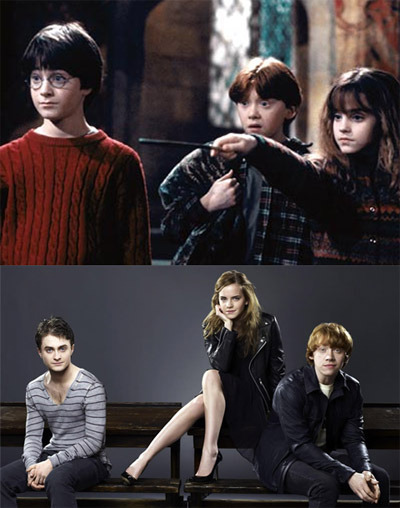
Daniel Radcliffe, Emma Watson and Rupert Grint (Harry, Hermione and Ron) from the first film and the last.
It would be fantastic if some other great book series' received the same kind of treatment, but it's unlikely. Not often does a prospect like Potter come along. Very few stories will guarantee a return on investment like Harry Potter does. It's beyond mainstream; it's ubiquitous. Producers and financers knew they could pretty much spend carte blanche on Harry Potter films and guarantee getting their money back several times over. Nothing is a safe bet like that in this world. Rowling created that – a guaranteed massive return investment. And you thought her magic was all fiction. This last installment shattered box office records worldwide, with US$169.2 million in US and Canadian ticket sales over the opening weekend. The opening weekend! And they've yet to truly milk it, with the rest of its cinema run, then DVDs, then special edition DVDs, then 8 film boxed sets. Not to mention all the associated merchandising.
Then there's Pottermore to keep the whole thing monetised. Then there's always the possibility of more books. The whole 19 Years Later thing at the end of the story is there as some kind of cap, but there are loads of ways around that if Rowling chooses to write more.
Of course, the real test of Rowling's skill will be to write something else. Amazing as the Potter success is, she'll always be measured against it and may not be able to write any other stories. I hope not. I hope she comes up with something all new, completely unrelated to Harry Potter and his world of wizards and witches, though I doubt she will.
So, for now at least, it's over. It really is the end of an era. Children started reading books with the success of Harry Potter and the Philosopher's Stone. They grew up alongside their favourite characters while film stars grew up playing those characters. I'm glad to have seen it through. There's a good sense of closure now and the books and films will stand as one of the greatest storytelling achievements of all time.
I'm still left with one question unanswered. Why does Harry Potter, or any other witch or wizard, wear glasses? They can regrow bones, for goodness sake. Surely they can fix a spot of myopia. Then again, perhaps it's good to be left with some questions. Well done J K Rowling, and well done Harry, Hermione and Ron. You all did good.
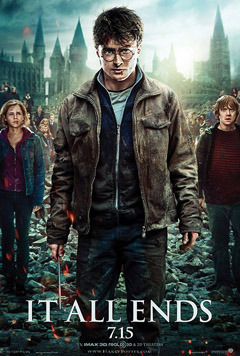
.
July 18, 2011
Kapow! At Angela Slatter's blog
Angela Slatter was kind enough to invite me to post over at her blog about fighting. In fact, she kinda threatened me, but that's okay. Fighting and writing are pretty much my favourite things.
.
July 14, 2011
A reading in Reno
 This is some very exciting news. Worldcon this year is in Reno, Nevada. I'm rather disappointed that I can't be there, as I love cons and would go to them all if I could afford it. But, even though I can't be there, my work can. Bob Kuhn, aka Tolkien's Dragon, will be reading excerpts from my novels, along with a bunch of other Aussie and Kiwi spec fic authors, whose company I'm honoured to share. Bob has a couple of reading slots reserved and he's generously offered to showcase Antipodean SF in those readings. Check out the kind of talent Reno will be exposed to – Harper Voyager authors Fiona McIntosh, Mary Victoria, Kim Falconer, Nicole Murphy and Helen Lowe, and cheeky ring-ins Angela Slatter, Lisa Hannett and myself. Possibly even more yet to be determined.
This is some very exciting news. Worldcon this year is in Reno, Nevada. I'm rather disappointed that I can't be there, as I love cons and would go to them all if I could afford it. But, even though I can't be there, my work can. Bob Kuhn, aka Tolkien's Dragon, will be reading excerpts from my novels, along with a bunch of other Aussie and Kiwi spec fic authors, whose company I'm honoured to share. Bob has a couple of reading slots reserved and he's generously offered to showcase Antipodean SF in those readings. Check out the kind of talent Reno will be exposed to – Harper Voyager authors Fiona McIntosh, Mary Victoria, Kim Falconer, Nicole Murphy and Helen Lowe, and cheeky ring-ins Angela Slatter, Lisa Hannett and myself. Possibly even more yet to be determined.
It makes me breathe a little fast just to be in a sentence with names like that, let alone have my work read among theirs by a talent like Bob. Here's the annoucement on the Voyager Blog.
I got to share a reading with Helen Lowe at last year's Worldcon in Melbourne, which was great fun. The only thing I can think of that would be better than reading my work to a room full of people at a Worldcon is having a professional voice artist do it for me!
So, if you're going to Reno for Worldcon, be sure to check out some great Aussie and Kiwi spec fic, read by Bob. You can get an idea of his great reading voice by listening to some sample recordings on his website here.
.
July 12, 2011
The Dark Knight Rises – official teaser poster
OMGOMGOMG! Christopher Nolan, who art our Bat-master, please please please make it three from three. (Click the image for full-size glory.)
.

